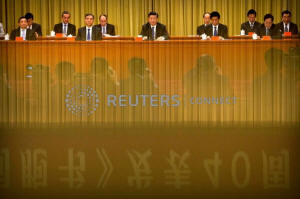Paid 'news': China using Taiwan media to win hearts and minds on island
- sources
 Send a link to a friend
Send a link to a friend
 [August 09, 2019]
By Yimou Lee and I-hwa Cheng [August 09, 2019]
By Yimou Lee and I-hwa Cheng
TAIPEI (Reuters) - The articles on the
website of the leading Taiwan newspaper were gushing about a new Chinese
government program to lure Taiwanese entrepreneurs to the mainland.
China "treated Taiwanese businessmen like its own people," one of the
articles said, citing "multiple perks". Far from being a threat to
Taiwan, the program to give economic incentives to Taiwanese to start
businesses in the mainland was an "unprecedented" opportunity, it said.
While the articles were presented as straight news, they were actually
paid for by the Chinese government, according to a person with direct
knowledge of the arrangement and internal documents from the
Taipei-based newspaper.
The placement of the articles was part of a broader campaign by China to
burnish its image in the Taiwanese media as part of efforts to win
hearts and minds in Taiwan for China's "reunification" agenda.
Reuters has found evidence that mainland authorities have paid at least
five Taiwan media groups for coverage in various publications and on a
television channel, according to interviews with 10 reporters and
newsroom managers as well as internal documents reviewed by Reuters,
including contracts signed by the Taiwan Affairs Office, which is
responsible for overseeing China's policies towards Taiwan.

The efforts have been going on since China and Taiwan deepened their
economic collaboration nearly a decade ago, but details like the
financial arrangements of such partnerships had not previously been
reported.
Reuters is withholding the name of the media groups at the request of
the former and current employees who provided the documents.
The Taiwan Affairs Office paid 30,000 yuan ($4,300) for the two feature
stories about the mainland's efforts to attract Taiwan business people,
according to a person familiar with the arrangements and internal
documents from the newspaper.
"It felt like I was running propaganda and working for the Chinese
government," the person said.
The placement of news stories by companies and special interests is
common in Taiwan. However, the commissioning of such stories by China is
potentially explosive in Taiwan, which has been increasingly sensitive
about mainland efforts to sway popular sentiment amid rising tensions
across the strait.
While the Taiwan Affairs Office paid for most of the stories in the
documents reviewed by Reuters, other Chinese government bodies also
commissioned stories, according to three people with direct knowledge of
the matter. One of the contracts was signed by a municipal government in
southern China.
China has viewed self-ruled Taiwan as a wayward province to be brought
under its control, by force if necessary, since a civil war divided the
two in 1949.
One senior news manager said he handled stories paid for by the Chinese
government at a major newspaper for several years. He left the
publication in 2016 and now works for a news organization affiliated
with the Taiwan government.
"The money was mostly paid via the Taiwan Affairs Office," said the
person, adding that provincial or municipal governments across China
also sponsored coverage.

The Taiwanese government said it was aware of the Chinese efforts and
that such partnerships were subject to a fine of up to T$500,000
($16,000) for violating regulations on Chinese advertisements.
"It is using our press freedom to harm press freedom," Chiu Chui-cheng,
the deputy minister for Taiwan's Ministry of Mainland Affairs, told
Reuters. "This is part of the mainland's media war against Taiwan," he
said, vowing to strengthen laws to close what he called "loopholes" in
Taiwan's national security.
"It's spreading messages of Chinese ideology, harming our free speech
and democracy."
[to top of second column]
|

A banner is reflected on a polished surface as Chinese President Xi
Jinping (C) speaks during an event to commemorate the 40th
anniversary of the "Message to Compatriots in Taiwan" at the Great
Hall of the People in Beijing, China January 2, 2019. Mark
Schiefelbein/Pool via REUTERS/File Photo

The Taiwan Affairs Office did not respond to requests for comment.
Employees from the media companies said Beijing's efforts to sway
the public's perception of China was undermining Taiwan's media.
"When funding from the Chinese government becomes a big part of your
revenue, it's impossible not to exercise self-censorship," said a
reporter, who said she was involved in several stories commissioned
by the Chinese government in 2017-2018 for a newspaper based in
southern Taiwan.
"It gives China space to manipulate politics and influence public
opinion in Taiwan."
Several reporters and newsroom managers said that some media
organizations were engaging in self-censorship as stories placed by
China had become increasingly important sources of income.
Issues seen as "sensitive" by China, such as the anniversary of the
Tiananmen crackdown in 1989, were no longer being covered by their
news outlets, they said.
Beijing's campaign comes at a time of growing concern over Chinese
infiltration in Taiwan. In June, tens of thousands of people rallied
to call for the regulation of "red media" – outlets that they
claimed ran favorable coverage of a China-friendly presidential
candidate ahead of key elections in January.
Two officials working at a Taiwanese state security agency, who
declined to be named due to the sensitivity of the matter, said
Chinese infiltration of Taiwan's media posed "threats" to the
island's security.
"Their ultimate goal is unification," said one of the sources, who
oversees Chinese activities on the island. "They think it is better
to win the heart of the people than to start a war."

The Taiwan Affairs Office has set up companies that carry out the
story placement campaign. The companies liaise with news
organizations' sales representatives, ordering up topics and lengths
for stories, five people with direct knowledge of the arrangements
said.
Such firms include Beijing-based Jiuzhou Culture Communication
Center, as well as Publishing Exchange Center Across the Taiwan
Strait in the southern Chinese city of Guangzhou, according to a
contract signed by the Taiwan Affairs Office unit and the Taipei
newspaper, as well as the person familiar with the arrangement.
Liu Tan, a representative from the Beijing company, ended a phone
call with Reuters after a reporter identified himself. The Guangzhou
company did not respond to requests for comment.
In one deal, signed in early 2017, the Beijing company paid the
publication 120,300 yuan in exchange for 10 full-page, color-print
stories to promote investments and tourism for an eastern Chinese
province.
The two features about the business incentives in the leading Taiwan
newspaper were even edited by the Taiwan Affairs Office before they
were sent to the paper's newsroom in Taipei for publication, the
person said.
The person added that the people interviewed in the reports had been
picked by an official from the Communist Party's Publicity
Department.
"Readers were unable to tell the stories were paid for," the person
said. "All they could see was positive coverage of the mainland."
(Reporting By Yimou Lee and I-hwa Cheng; editing by Philip
McClellan)
[© 2019 Thomson Reuters. All rights
reserved.]
Copyright 2019 Reuters. All rights reserved. This material may not be published,
broadcast, rewritten or redistributed.
Thompson Reuters is solely responsible for this content. |